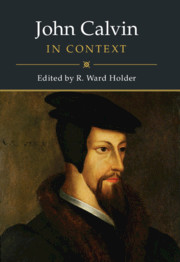Book contents
- John Calvin in Context
- John Calvin in Context
- Copyright page
- Dedication
- Contents
- Contributors
- Acknowledgments
- Abbreviations
- Introduction
- Part I France and Its Influence
- 1 John Calvin’s Life
- 2 French Christianity in the Early 1500s
- 3 The University of Paris during Calvin’s Life
- 4 French Humanism
- 5 French Religious Politics
- 6 The French Wars of Religion
- Part II Switzerland, Southern Germany, and Geneva
- Part III Empire and Society
- Part IV The Religious Question
- Part V Calvin’s Influences
- Part VI Calvin’s Reception
- Conclusion
- Bibliography
- Index
- References
1 - John Calvin’s Life
from Part I - France and Its Influence
Published online by Cambridge University Press: 14 November 2019
- John Calvin in Context
- John Calvin in Context
- Copyright page
- Dedication
- Contents
- Contributors
- Acknowledgments
- Abbreviations
- Introduction
- Part I France and Its Influence
- 1 John Calvin’s Life
- 2 French Christianity in the Early 1500s
- 3 The University of Paris during Calvin’s Life
- 4 French Humanism
- 5 French Religious Politics
- 6 The French Wars of Religion
- Part II Switzerland, Southern Germany, and Geneva
- Part III Empire and Society
- Part IV The Religious Question
- Part V Calvin’s Influences
- Part VI Calvin’s Reception
- Conclusion
- Bibliography
- Index
- References
Summary
John Calvin was born on July 10, 1509 in Noyon, France to his parents, Gérard Cauvin and Jeanne LeFranc; he was a second-born son, between an older brother Charles and two younger brothers Antoine and François. His mother, whom he remembered for her piety, died when Calvin was only six years old. Gérard Cauvin remarried, and his second wife bore two daughters. Gérard had obtained bourgeois status in 1497 and served as a city magistrate in Noyon. Intending Calvin for the priesthood, his father made arrangements to fund his education through his connections with the bishop and diocesan chapter of Noyon. Consequently, in the spring of 1521, Charles de Hangest, bishop of Noyon, provided Calvin his first ecclesiastical benefice of a third share of the Chapel of La Gésine. A second benefice was added in 1527 providing revenues from Saint-Martin de Martheville.
- Type
- Chapter
- Information
- John Calvin in Context , pp. 9 - 16Publisher: Cambridge University PressPrint publication year: 2019

